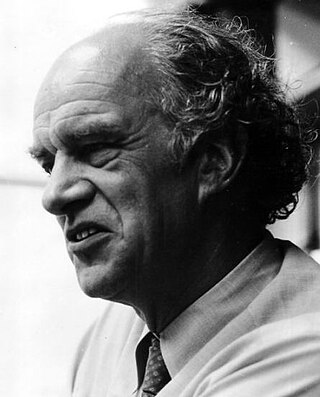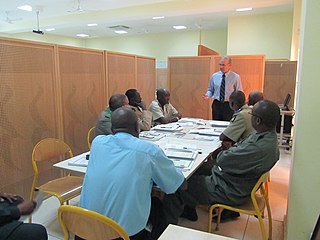
The politics of Indonesia take place in the framework of a presidential representative democratic republic whereby the President of Indonesia is both head of state and head of government and of a multi-party system. Executive power is exercised by the government. Legislative power is vested in both the government and the bicameral People's Consultative Assembly. The judiciary is independent of the executive and the legislature.

Samuel Phillips Huntington was an American political scientist, adviser, and academic. He spent more than half a century at Harvard University, where he was director of Harvard's Center for International Affairs and the Albert J. Weatherhead III University Professor.

Democratization, or democratisation, is the structural government transition from an authoritarian government to a more democratic political regime, including substantive political changes moving in a democratic direction.
The term "illiberal democracy" describes a governing system that hides its "nondemocratic practices behind formally democratic institutions and procedures". There is a lack of consensus among experts about the exact definition of illiberal democracy or whether it even exists.
Modernization theory holds that as societies become more economically modernized, wealthier and more educated, their political institutions become increasingly liberal democratic. The "classical" theories of modernization of the 1950s and 1960s, most influentially articulated by Seymour Lipset, drew on sociological analyses of Karl Marx, Emile Durkheim, Max Weber, and Talcott Parsons. Modernization theory was a dominant paradigm in the social sciences in the 1950s and 1960s, and saw a resurgence after 1991, when Francis Fukuyama wrote about the end of the Cold War as confirmation on modernization theory.

Guillermo Alberto O'Donnell Ure was a prominent Argentine political scientist who specialized in comparative politics and Latin American politics. He spent most of his career working in Argentina and the United States, and who made lasting contributions to theorizing on authoritarianism and democratization, democracy and the state, and the politics of Latin America. His brother is Pacho O'Donnell.

Dankwart Alexander Rustow was a professor of political science and sociology specializing in comparative politics. He is prominent for his research on democratization. In his seminal 1970 article 'Transitions to Democracy: Toward a Dynamic Model,' Rustow broke from the prevailing schools of thought on how countries became democratic. Disagreeing with the heavy focus on necessary social and economic pre-conditions for democracy, he argued that national unity was the necessary precondition for democracy.
In political science, the waves of democracy or waves of democratization are major surges of democracy that have occurred in history. Although the term appears at least as early as 1887, it was popularized by Samuel P. Huntington, a political scientist at Harvard University, in his article published in the Journal of Democracy and further expounded in his 1991 book, The Third Wave: Democratization in the Late Twentieth Century. Democratization waves have been linked to sudden shifts in the distribution of power among the great powers, which created openings and incentives to introduce sweeping domestic reforms.

A democratic transition describes a phase in a country's political system as a result of an ongoing change from an authoritarian regime to a democratic one. The process is known as democratisation, political changes moving in a democratic direction. Democratization waves have been linked to sudden shifts in the distribution of power among the great powers, which created openings and incentives to introduce sweeping domestic reforms. Although transitional regimes experience more civil unrest, they may be considered stable in a transitional phase for decades at a time. Since the end of the Cold War transitional regimes have become the most common form of government. Scholarly analysis of the decorative nature of democratic institutions concludes that the opposite democratic backsliding (autocratization), a transition to authoritarianism is the most prevalent basis of modern hybrid regimes.

Democracy promotion, also referred to as democracy building, can be domestic policy to increase the quality of already existing democracy or a strand of foreign policy adopted by governments and international organizations that seek to support the spread of democracy as a system of government. In practice, it entails consolidating and building democratic institutions
Authoritarianism is a political system characterized by the rejection of political plurality, the use of strong central power to preserve the political status quo, and reductions in democracy, separation of powers, and the rule of law. Political scientists have created many typologies describing variations of authoritarian forms of government. Authoritarian regimes may be either autocratic or oligarchic and may be based upon the rule of a party or the military. States that have a blurred boundary between democracy and authoritarianism have some times been characterized as "hybrid democracies", "hybrid regimes" or "competitive authoritarian" states.

Democracy promotion by the United States aims to encourage governmental and non-governmental actors to pursue political reforms that will lead ultimately to democratic governance.
Anocracy, or semi-democracy, is a form of government that is loosely defined as part democracy and part dictatorship, or as a "regime that mixes democratic with autocratic features". Another definition classifies anocracy as "a regime that permits some means of participation through opposition group behavior but that has incomplete development of mechanisms to redress grievances." The term "semi-democratic" is reserved for stable regimes that combine democratic and authoritarian elements. Scholars distinguish anocracies from autocracies and democracies in their capability to maintain authority, political dynamics, and policy agendas. Anocratic regimes have democratic institutions that allow for nominal amounts of competition. Such regimes are particularly susceptible to outbreaks of armed conflict and unexpected or adverse changes in leadership.
A hybrid regime is a type of political system often created as a result of an incomplete democratic transition from an authoritarian regime to a democratic one. Hybrid regimes are categorized as having a combination of autocratic features with democratic ones and can simultaneously hold political repressions and regular elections. Hybrid regimes are commonly found in developing countries with abundant natural resources such as petro-states. Although these regimes experience civil unrest, they may be relatively stable and tenacious for decades at a time. There has been a rise in hybrid regimes since the end of the Cold War.

Embedded democracy is a form of government in which democratic governance is secured by democratic partial regimes. The term "embedded democracy" was coined by political scientists Wolfgang Merkel, Hans-Jürgen Puhle, and Aurel Croissant, who identified "five interdependent partial regimes" necessary for an embedded democracy: electoral regime, political participation, civil rights, horizontal accountability, and the power of the elected representatives to govern. The five internal regimes work together to check the power of the government, while external regimes also help to secure and stabilize embedded democracies. Together, all the regimes ensure that an embedded democracy is guided by the three fundamental principles of freedom, equality, and control.
Modernisation refers to a model of a progressive transition from a "pre-modern" or "traditional" to a "modern" society. The theory particularly focuses on the internal factors of a country while assuming that, with assistance, traditional or pre-modern countries can be brought to development in the same manner which more developed countries have. Modernisation theory attempts to identify the social variables that contribute to social progress and development of societies, and seeks to explain the process of social evolution. Modernisation theory is subject to criticism originating among socialists and free-market ideologies, world-systems theorists, globalisation theorists and dependency theorists among others. Modernisation theory not only stresses the process of change, but also the responses to that change. It also looks at internal dynamics while referring to social and cultural structures and the adaptation of new technologies.
Democracy and economic growth and development have had a strong correlative and interactive relationship throughout history. While evidence of this relationship's existence is irrefutable, economists' and historians' opinions of its exact nature have been sharply split, hence the latter has been the subject of many debates and studies.

Democratic backsliding is a process of regime change toward autocracy that makes the exercise of political power by the public more arbitrary and repressive. This process typically restricts the space for public contestation and political participation in the process of government selection. Democratic decline involves the weakening of democratic institutions, such as the peaceful transition of power or free and fair elections, or the violation of individual rights that underpin democracies, especially freedom of expression. Democratic backsliding is the opposite of democratization.
Neoauthoritarianism, also known as Chinese Neoconservativism or New Conservatism since the 1990s, is a current of political thought within the People's Republic of China (PRC), and to some extent the Chinese Communist Party (CCP), that advocates a powerful state to facilitate market reforms. It has been described as right-wing, classically conservative even if elaborated in self-proclaimed "Marxist" theory.

Democracy in Africa is measured according to various definitions of democracy by a variety of indexes, such as V-Dem Democracy indices, and Democracy Index by The Economist.









